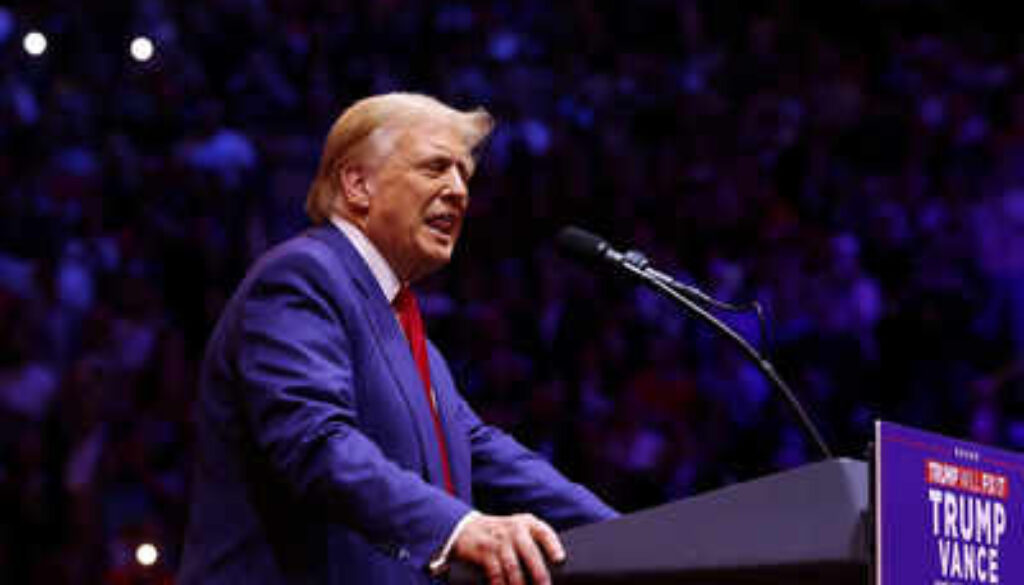Donald Trump Allied Comedian’s ‘Puerto Rico is Garbage’ Controversy
Comedian Sparks Controversy with Comments at Donald Trump Rally
For instance, a month ago at a Donald Trump rally in New York, comedian Tony Hinchcliffe sparked outrage by stating about Puerto Rico that it is a “floating island of garbage.”
Before appearing in front of the stage at Madison Square Garden to Trump himself, Hinchcliffe made some more edgy remarks concerning Latino culture; for example, that Latinos “love making babies” and don’t “pull out.”
All these have been described by many U.S politicians and celebrities of Puerto Rico as racist stereotypes.
Kamala Harris’s presidential campaign, Puerto Rican celebrities, and even some members of Congress even Republicans strongly condemned the comments.
The Trump campaign denounced Hinchcliffe’s words, saying they “don’t reflect President Trump’s views,” but again, the former president had uttered similar divisive rhetoric when running for office in the past.
A Wake-Up Call for Puerto Rican Voters
It also happens that the residents are U.S. citizens and have no voting representation in Congress and don’t vote in presidential elections;
yet, Puerto Rican residents dwelling in the continental United States, especially swing states going into this election, constitutes a significant bloc of voting capacity. Ed Rosa, 60, of the Bronx and a native Puerto Rican, expressed his disappointment in Hinchcliffe’s words.
I’m a huge Trump supporter,” he said. “But I’d sit out an election if this is what the Republican Party has to offer.” Rosa’s flip is indicative of the price of incendiary language for the Latino voter at the expense of the Republican Party.
As is the case in a very competitive electoral landscape, with Puerto Rican voters being particularly important in battleground states such as Pennsylvania, Democrats are all the more eager to energize this demographic.
“Absolutely disgusting,” said Matt Tuerk, the Democratic mayor of Allentown, which has a majority Latino population and nearly one-third Puerto Rican residents. “It’s a wake-up call for those who may think that Trump’s rhetoric doesn’t matter.”.
Political leaders and celebrities react
In response to Hinchcliffe’s statement, Vice President Harris said that Puerto Rico is home to some of the “most talented, innovative, and ambitious people” in the nation.
Puerto Rican celebrities, including Jennifer Lopez, Bad Bunny, and Ricky Martin, also reacted to Hinchcliffe’s statements, criticizing him and pointing out the good contributions of Puerto Ricans to American society.
Endorsement by the Bad Bunny helped Harris so that there was real potential for mobilization within the Puerto Rican community.
Hinchcliffe attempted to downplay the offense caused by his remarks by saying that people were not funny enough. His comments, however, were not only limited to Puerto Rico; he also used racist stereotypes regarding Black Americans and Jewish people during his show.
These remarks have caused an outcry from different corners, increasing attention to the tolerance of the Trump campaign for racist rhetoric.
The Trump Campaign Position
Where, on the other hand, others within the campaign appeared pretty unflappable, several Trump supporters, including US Senator Rick Scott and Republican Representatives Anthony D’Esposito and Maria Elvira Salazar, quickly criticized Hinchcliffe’s comments.
Stephen Miller, a senior adviser to Trump, was quoted as saying that “America is for America and Americans only,” a comment taken to be anathema to the sense of inclusiveness of immigrants.
Republican fundraiser David Tamasi downplayed the electoral implications of Hinchcliffe’s remarks, arguing that undecided voters would not be moved by an unknown comedian.
That view aligns with a broader sense of feeling within the Trump campaign: despite the scandals, the former president’s base remains solid.
The Battle in the Political Arena Heats Up
This has come into the limelight with more tensions as the election draws close. Debates around Hinchcliffe’s words represent bigger divisions in American politics.
And the interplay between these elements of humor, race, and political discourse keeps on being contentious, not least in an environment marked by shifting demographics and new power for minority voters.
Traditionally Democratic but increasingly going Republican in many areas, the Latino vote has thus far proved resistant to such kind of rhetoric. Still, instances like this will galvanize opposition and drive turnout among those who feel marginalized.
Following Hinchcliffe’s comments, candidates would have to walk on a tightrope with regard to the intricate web of identity and representation.
For Trump, the question will be how to maintain the base’s support while responding to the backlash from large segments such as Puerto Ricans and other Latino voters. In contrast, for the Democrats, capitalizing on such moments to unite and mobilize the Latino community could be the difference in battleground states.
Conclusion: Impact of Rhetoric on Public Vote
Hinchcliffe’s comments have become the litmus test for the current political environment, revealing how seemingly isolated comments can resonate far and wide and affect voter opinion.
It remains to be seen how this fallout will reshape the electoral landscape in the final days leading up to the election as both the Trump and Harris campaigns continue to zero in on the Latino vote in swing states.
With tensions high and both parties keenly interested in winning the Latino vote, the aftermath of Hinchcliffe’s show highlights the role of language in molding public opinion and voter choice.
The growing spotlight on political rhetoric about race and identity will continue to shape the strategies of both parties as they seek support from critical voting blocs in the election.



